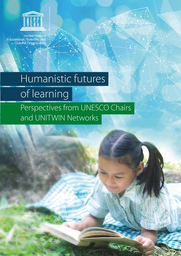What do we mean by ‘engagement’? Answering this question is a challenge in a fast- changing social world – a challenge which must be addressed through education […]. ‘Engagement’ in the context of building citizenship skills is better defined as a ‘feeling of belonging,’ a condition that enables mutual recognition, responsibility and freedom… [A]renas for dialogue, co-design and the sharing of experiences among adults should be promoted to enable the problematization of practices and behaviours as well as the quest for coherence among different points of view, cultures and values. This plural, collaborative and dialogical environment is necessary for younger generations to flourish, one which holds an invitation to build the communities of tomorrow.
Simeone D, Aglieri M, Amadini M, Cadei L, Locatelli R, Raccagni D, Serrelli E, Solesin L, Bonometti S (2020). Engaging contexts and citizenship skills: Steps towards an ‘engagement paradigm’. In Humanistic futures of learning – Perspectives from UNESCO Chairs and UNITWIN Networks, UNESCO, Paris, pp. 78-81. ISBN 978-92-3-100369-1

Abstract
Today, rapid changes characterize social and political contexts all around the world, bringing into question fundamental notions, such as citizenship and public engagement. There is an erosion of trust in institutions, leading to civic disengagement, individualism and social fragmentation. More broadly, people are detached from and dissatisfied with, public life. The concept of national citizenship is also changing, impacted by multiple processes related to globalization – i.e. growing access to information and knowledge through digital media; increasing migration and cross-border mobility; and urgent environmental issues related to climate change. Social relationships currently expand well beyond any national border while connections and interdependence intensify between local and global levels (UNESCO, 2018; Tawil, 2013).
At the same time, the space and time of citizenship and public engagement are being called into question due to the disruptive changes brought about by the exploding use of new technologies, which has created a proliferation of identities and virtual communities. New forms of association and participation thus emerge – although they are mainly “unorganized organizations” that have yet to generate proper collective acknowledgement and identification. These experiences allow people to ‘take part’ but offer little in the way of ‘being part of ’ a collective. This is crucial as ‘being part of ’ is indeed the fundamental goal of citizenship. In this context, citizenship skills are a pressing necessity that needs to be strengthened.
Links
Fulltext
Publicatt